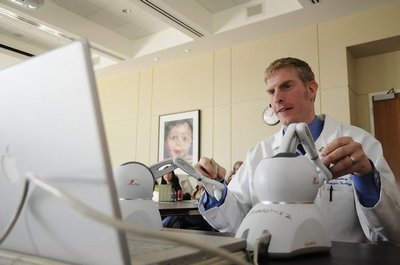January 27, 2010
Surgeon studies effect of a pre-operative ‘warm up’
Baseball pitchers warm up in the bullpen and basketball players practice lay-ups before hitting the court. Will surgeons one day warm up to ensure they’re better prepared for the equivalent of a big game?
Dr. Tom Lendvay, University of Washington assistant professor, Department of Urology, said it’s possible. The surgeon recently received an award from the U.S. Army Medical Research and Materiel Command to study the effect of a pre-operative warm-up on virtual reality surgical task proficiency. Maj. Timothy Brand, a surgeon based at Madigan Army Medical Center in Tacoma, Wash., is collaborating with UW on the study.
“We are investigating whether surgical trainees should warm up prior to surgery, and we’re including experienced surgeons in our study,” said Lendvay, co-director of Seattle Children’s Robotic Surgery Center. “We might discover that everyone should warm up before operating. That would be a complete paradigm shift in surgical preparation.”
The virtual reality simulator is based on the da Vinci surgical robot, which is used to perform complex surgery using a minimally invasive approach. Lendvay and his team will design software and hardware and a proficiency-based curriculum with measurable outcomes. Medical students, surgical residents and faculty will test the curriculum over an 18-month project timeline, with an end date of March 2011.
One previous study—conducted by UW and Arizona State University researchers—found that the warm-up did indeed make a difference. “Even experienced surgeons derived benefit from the warm-up and there was an error reduction in surgical skills,” said Lendvay.
Lendvay said that in addition to general surgical training, the study findings could have implications for surgeons deployed by the military overseas. “How do we keep surgeons deployed overseas up-to-date with surgical skills so that they’re set to practice when they return to the U.S.?” he said. “These surgeons have ebbs and flows in the number of patients they’ll see and experience some down time. It’s likely that they would benefit from virtual reality surgical task training.”

